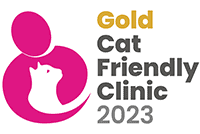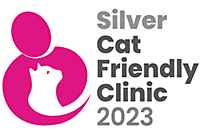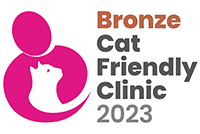Dr Chris Maguire VetMB MA CertSAM MACVSc (feline) MRCVS
Chris is an Advanced Practitioner in Feline Medicine based at our Highbury Village Vet practice. In this interview, he discusses what inspires him, pain management in cats and various matters that are important to every cat parent.
Tell us about your background and what lead you to become an Advanced Practitioner in Feline Medicine
I grew up in semi-rural Midlands and as a child had an array of pets – rabbits, guinea pigs, budgies and even Californian newts! After school, I headed to Cambridge Veterinary School and developed my interest in small animals. I was incredibly lucky that my first job as a new graduate Vet was in a North London veterinary clinic which had a real focus on good quality feline medicine. Procedures and protocols had been put into place by Feline Specialists and maintained by my excellent colleagues at the time. Rather than just dispensing medications I was taught to diagnose first and then treat appropriately. This has stuck with me throughout my career. I was lucky enough to be involved with a London cat charity during the first 7 years of my career and so I had exposure to a very large number of cats at varying life stages with a variety of different acute and chronic conditions. I went on to study for further qualifications in small animal medicine and then subsequently feline medicine. For the last four years, I have been involved with mentoring and examining in feline medicine for postgraduate vets which has been very rewarding.
Tell us about your first cat. How many cats do you own?
My first cat as a child was an elderly stray who followed me home from scouts on a cold winter night. We never really knew where she had come from but was clearly in need of shelter and food. Initially, we only fed her outside but she quickly became part of the household and lived out her retirement with us. This was the start of my journey with cats. After this, I was determined to have another cat and contacted the local Cat’s Protection Charity who homed a young female cat to us. Little did we know that she had not been neutered as they had thought and she went on to have kittens. We kept one, but unfortunately, he died at only 5 years of age of an acute asthma attack the week before I went to study at Cambridge Vet School. In my previous position, I lived above the veterinary clinic and one night discovered a box had been left on our doorstep. In the box was an abandoned queen and her five newborn kittens. We kept two of these and one is still alive 12 years on!
Before your role in Highbury, you worked at the 24 Hour Village Vet Hospital located in Hampstead. How would you describe the transition to becoming the Head Veterinary Surgeon at Highbury?
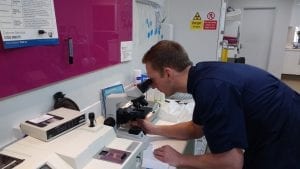 The transition from Hampstead to Highbury was surprisingly easy. The same ethos of providing exceptional care to both pets and their owners is consistent across the Village Vet group. Both Becky the veterinary nurse and Steven on reception, having been at Highbury since inception, also helped to ensure that the move went smoothly and their help and support was invaluable.
The transition from Hampstead to Highbury was surprisingly easy. The same ethos of providing exceptional care to both pets and their owners is consistent across the Village Vet group. Both Becky the veterinary nurse and Steven on reception, having been at Highbury since inception, also helped to ensure that the move went smoothly and their help and support was invaluable.
My goal is to bring the skills and knowledge that I have gained from working in a busy 24-hour clinic with a high medical workload to benefit the animals of Highbury.
What are the top 3 pieces of advice you’d give to any cat parent?
- Trust your instinct when you feel that you cat is unwell. Cats often do not show specific or obvious signs of illness. If in doubt, see your vet.
- Regular health checks with the vet – at least annually for younger cats (<8years) and twice a year for older cats (more often if indicated). Even if you think your cat is doing well the health exam can identify early stages of a disease.
- Think about your cat’s home and consider environmental enrichment, especially if they are indoors. Examples of things to consider are water fountains/drinking behaviour, hiding places, perches (cats like being up high), windowsill viewing areas, food puzzles, toys, scratching posts, catnip, and litter tray position and litter type.
Cats have an instinctive drive to hide an illness, pain or injury. Can you tell us a few signs that every pet owner should be aware of?
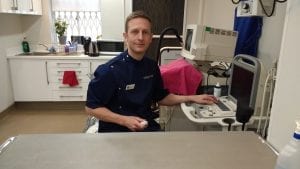 Yes, cats can show very subtle signs of illness. Any change from the norm can be an indicator. Subtle signs that should warrant attention are inappetence, lethargy, behavioural changes and weight loss as well as the more obvious signs of vomiting, diarrhoea or urinary issues. The majority of poorly cats that present to me will be because of lethargy and reduced appetite and yet the spectrum of conditions that underly this can be immense – cardiac, gastrointestinal, urinary, behavioural, respiratory and even musculoskeletal conditions. A full clinical examination by the vet can give lots of clues as to what may be going on. An early diagnosis is vital to achieving the best outcome.
Yes, cats can show very subtle signs of illness. Any change from the norm can be an indicator. Subtle signs that should warrant attention are inappetence, lethargy, behavioural changes and weight loss as well as the more obvious signs of vomiting, diarrhoea or urinary issues. The majority of poorly cats that present to me will be because of lethargy and reduced appetite and yet the spectrum of conditions that underly this can be immense – cardiac, gastrointestinal, urinary, behavioural, respiratory and even musculoskeletal conditions. A full clinical examination by the vet can give lots of clues as to what may be going on. An early diagnosis is vital to achieving the best outcome.
Tell us about pain management in cats. Some painkillers can be much more toxic for cats than dogs.
Pain relief in cats has historically been a neglected area for two main reasons. One is that pain recognition is harder, and secondly, many drugs that are used in people and dogs are very toxic to cats. Paracetamol is a good example of a drug that is highly toxic and invariably fatal if given to cats.
Thankfully, as cats are no longer seen as ‘small dogs’ by both vets and pharmaceutical companies we now have many options for analgesia in both acute conditions such as following surgery and more chronic conditions such as osteoarthritis in older cats.
As cats get older, they are susceptible to many conditions. As a cat parent, what should one be aware of and what pro-active steps can a pet owner take?
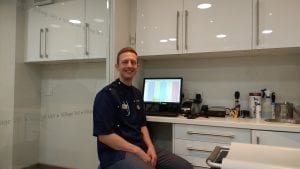 Early diagnosis of many conditions that older cats are prone to can mean earlier intervention and better outcome. Examples of conditions that we see very commonly in cats over 8 years of age include chronic kidney disease, hyperthyroidism, diabetes mellitus, high blood pressure, dental disease and osteoarthritis. There are lots of management options available for these conditions but the outcome will be vastly improved if detected early.
Early diagnosis of many conditions that older cats are prone to can mean earlier intervention and better outcome. Examples of conditions that we see very commonly in cats over 8 years of age include chronic kidney disease, hyperthyroidism, diabetes mellitus, high blood pressure, dental disease and osteoarthritis. There are lots of management options available for these conditions but the outcome will be vastly improved if detected early.
Regular visits to see the vet for a health exam are vital in detecting early disease – subtle weight loss can be the first indicator before more obvious signs such as excessive thirst, increased or decreased appetite. The physical examination can screen for a goitre (enlarged thyroid gland), a change in heart rate, the size of the kidneys, and other findings that may prompt blood and urine tests to screen for disease.
Pet obesity has been discussed a lot in the media lately, what should a cat parent know to help their cat retain a healthy weight?
There are lots of factors that contribute to a pet becoming over weight: feeding style, use of treats, diet, sedentary lifestyle/activity levels, drugs/illness, breed/age/sex. The key is to first identify whether a cat is overweight and your vet or vet nurse can help do a body condition score and then tailor a suitable diet/exercise plan to help reduce the weight at an appropriate rate. There are a multitude of suitable diets and also food puzzle toys that can help in this situation.
With advances in veterinary science and increased access to specialists’ veterinary referrals centres, do you feel that vets can prolong the life expectancy of more cats?
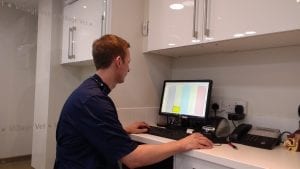 Early diagnosis is essential and so a great relationship between the cat, the owner and the Vet is of paramount importance. The advances that I have seen in my career over 16 years have been immense and have drastically benefited cats. The availability of ultrasound in general practice, as well as more advanced imaging such as CT, means that we can often reach a diagnosis using minimally invasive techniques. Medications that are easier to administer to cats are now also readily available taking some of the stress out of treating feline patients.
Early diagnosis is essential and so a great relationship between the cat, the owner and the Vet is of paramount importance. The advances that I have seen in my career over 16 years have been immense and have drastically benefited cats. The availability of ultrasound in general practice, as well as more advanced imaging such as CT, means that we can often reach a diagnosis using minimally invasive techniques. Medications that are easier to administer to cats are now also readily available taking some of the stress out of treating feline patients.
What advice would you give to future veterinarians who are interested in specialising in feline care?
Do it ! Cats can be challenging but are immensely rewarding. Allow the cat to relax in the consulting room and minimise stress at all times. Always take an accurate detailed history and perform a full physical examination.






